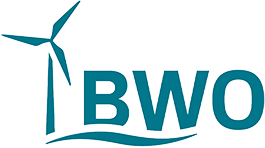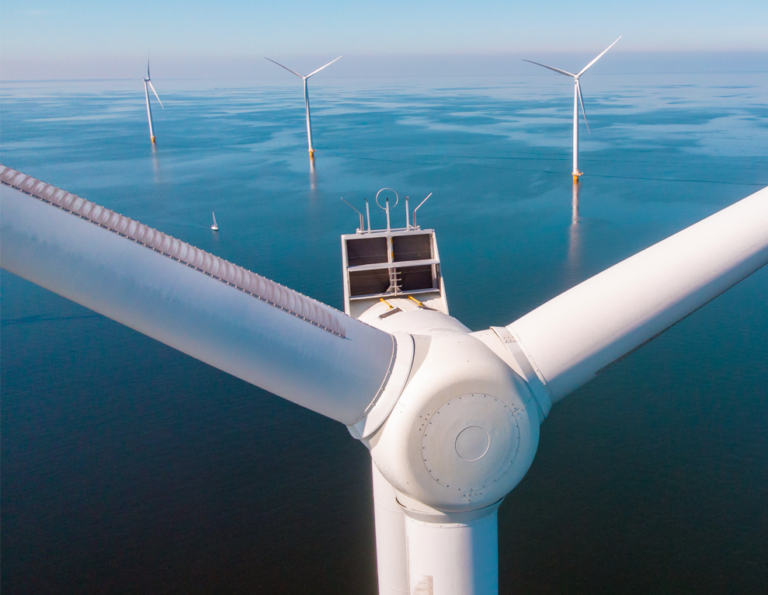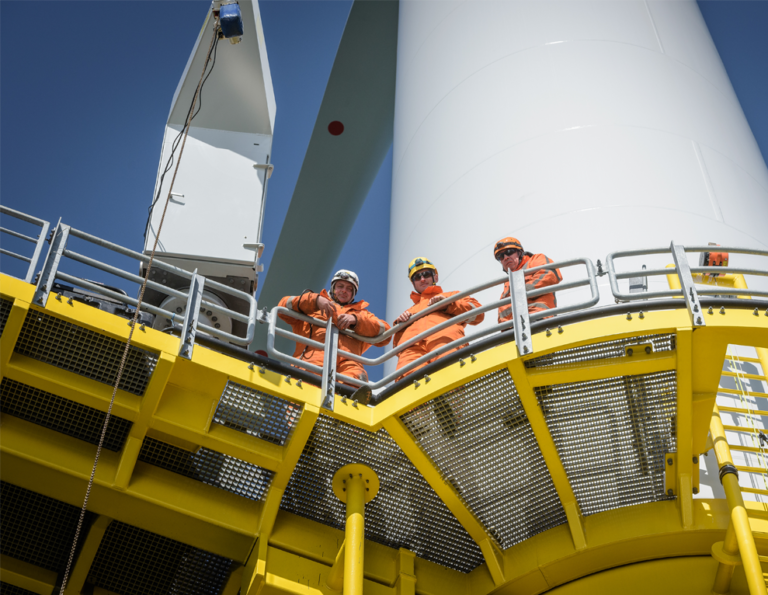No expansion of offshore wind energy in the first half of 2021 - now keep skilled workers and enable uniform utilization
press report
Berlin / Bremerhaven / Frankfurt, July 15, 2021 - For the first time in more than ten years, there will be no expansion of offshore wind energy in Germany this year. This expansion gap is not an expression of a lack of interest from investors or a lack of strength from industry, but a consequence of political decisions, the effects of which are now becoming visible for the offshore wind industry in Germany. This development can only be counteracted by raising the expansion targets for offshore wind energy, retaining skilled workers and specifying the expansion plans for green hydrogen.
“As expected, the offshore industry met the expansion target for 2020 and has long since become a mainstay of the energy transition. Offshore wind energy is reliable and competitive. It is an important economic driver and will also play a key role in achieving Germany's recently increased climate targets. However, some market participants have already left the offshore wind industry or have relocated their location from Germany to other countries. This fact can be traced back to the increasing international requirements, which demand a share of the added value in national markets, as well as to the lack of prospect of offshore wind construction activities in Germany this year. German politics can no longer watch such a development. It needs a swift industrial policy impulse, ”comment the industry organizations BWE, BWO, Foundation OFFSHORE WIND ENERGY, VDMA Power Systems and WAB on the situation in the industry.
“In order to maintain the technology leadership of Germany as a wind industry location and to ensure domestic added value and employment in the future, the expansion must be rekindled and consolidated in a clear line. From the middle and especially towards the end of the decade, the industry expects increased to very strong expansion. This imbalance should definitely be counteracted in good time. The acceleration of the grid expansion measures on land and the better utilization of the existing grids also remain important. Against the background of the climate targets specified by the Bundestag, the previous offshore expansion targets are no longer sufficient. Target adjustments are needed for 2030 and 2040, ”the industry organizations continue to explain.
Maintain employment and develop market design
The current expansion gap must be contained. At the same time, with a view to the expansion targets up to 2030 and 2040, it will be necessary to maintain added value and employment in Germany and to sustainably strengthen the attractiveness of the German offshore wind market. For this, free potential must be tapped as quickly as possible and attractive and reliable investment conditions must be created. "Otherwise, Germany has bad cards in an increasingly international market," warn the industry organizations. Politicians should use short-term available potential to reverse the negative value creation and employment trend with construction activities, qualification measures and a tailor-made export and research offensive and to stabilize it in a positive way. The point is to secure employment today and to make the strengths of the nationwide offshore wind industry usable for upcoming challenges, such as the development of a “green” hydrogen economy.
In addition, the market design for offshore wind energy must be further developed in order to relieve both consumers and the economy and to create a reliable investment framework for national and international investors from all stakeholder groups.
Specify expansion plans for “green” hydrogen
Technologies for building a “green” hydrogen economy in addition to electrification through electricity from offshore wind is an opportunity for energy plant construction in Germany - also for export. Therefore, the foundations for this need to be laid now. It is also clear, however, that this cannot compensate for the current expansion gap. For the expansion goals formulated last year for offshore wind in connection with green hydrogen by 2040, additional areas must be defined in the North and Baltic Seas as soon as possible. In the areas previously intended for the production of green hydrogen at sea - and so far not connected by cable or pipeline - an economical production of green hydrogen is not possible in order to make a high contribution to the hydrogen target of 5 GW by 2030 in Germany. Competing interests in the use of shipping, the navy and nature conservation must be resolved in the interests of climate protection in order to ensure that the defined goals are achieved. The co-use approach developed by the EU Commission, according to which the scarce sea space should - if possible - be used by several actors at the same time, is suitable for this. This idea can be developed further and should also be used more in Germany. “It is clear to us that capacities of well over 50 GW offshore wind are necessary and also feasible in the German North Sea and Baltic Sea. Current reports speak of 54 and 57 GW of expansion potential. * Since the expansion of renewable energies is important for long-term species protection, compromises urgently need to be found here. The current draft of the spatial plan is a good start for this ”, explain the industry organizations.
In order to implement the National Hydrogen Strategy, politicians must also create a market-based basis for green hydrogen and also demand this at European level. The framework for the EEG surcharge exemption for green electricity for hydrogen generation is a good approach, which must be followed by additional steps: A binding target for the generation of green hydrogen from offshore wind energy and reliable allocation mechanisms. In order to achieve the set goal of ramping up the market for hydrogen, it is urgently necessary to combine hydrogen production with the expansion of wind energy capacities at sea.
Increase target by 2030, present targets for 2045 and 2050
The federal government's new goal of achieving climate neutrality by 2045 should be underpinned by concrete expansion goals for offshore wind and green hydrogen, followed by a goal by 2050. This goal should be in line with demand forecasts for green electricity and green hydrogen as well as the The EU aims to expand offshore wind energy to 2050 GW by 300. This enables planning that can be further developed through Europe-wide and international cooperation.
* Short links to the reports: https://bit.ly/3wAXbca / https://bit.ly/3i2RZbN
Attachment:
About the Bundesverband Windenergie eV (BWE)
As a member of the German Renewable Energy Association (BEE), the BWE represents the entire industry with over 20.000 members. Together, the supplier and manufacturer industry anchored in German mechanical engineering, project planners, specialized lawyers, the financial sector as well as companies from the fields of logistics, construction, service / maintenance and storage technologies, electricity traders, network operators and energy providers ensure that the BWE is available to all questions relating to the Wind energy is the first point of contact for politics and business, science and the media.
About the Federal Association of Wind Farm Operators Offshore eV (BWO)
The Federal Association of Wind Farm Operators Offshore (BWO eV) is the federal association of all companies that plan, build and operate wind farms in Germany. In this way, the BWO bundles the strength and know-how for a successful energy transition in Germany and Europe. The BWO was founded at the beginning of 2015 as the Offshore Wind Working Group (AGOW) and now has 18 members.
About the OFFSHORE WIND ENERGY foundation
The non-profit foundation of the German economy for the use and research of wind energy at sea was founded in 2005 on the initiative of the industry and moderated by the Federal Ministry for the Environment, Nature Conservation and Nuclear Safety (BMU). The aim of the foundation is to consolidate the role of offshore wind energy in the energy mix of the future in Germany and Europe and to promote its expansion in the interests of environmental and climate protection.
About VDMA Power Systems
VDMA Power Systems is a trade association of the Association of German Mechanical and Plant Engineering VDMA eV The trade association represents the interests of manufacturers of wind energy and hydropower systems, fuel cells, gas / steam turbines and systems as well as engine systems at home and abroad. For all of them, VDMA Power Systems serves as an information and communication platform for all topics in the sectors such as energy policy, legislation, market analyzes, trade fairs, norms, standardization as well as press and public relations.
About WAB eV
The WAB, based in Bremerhaven, is the nationwide contact for the offshore wind industry Onshore network in the northwest and promotes the production of "green" hydrogen from wind power. The association includes around 250 smaller and larger companies as well as institutes from all areas of the Wind industry, the maritime industry and research.
Federal Association Federal Association of the Foundation
WindEnergie Windparkbetreiber Offshore eV OFFSHORE-WINDENERGIE
Wolfram Axthelm Lena Botter Marlen Sunnyi Bean
Tel. 030 212341-251 Tel. 030 28444-651 Tel. 030 27595-198
w.axthelm@wind-energie.de l.botter@bwo-offshorewind.de m.bohne@offshore-stiftung.de
VDMA Power Systems WAB eV
Beatrice Fontius Hans-Dieter Sohn
Tel. 069 6603-1886 Tel. 0173 238 2802
beatrix.fontius@vdma.org hans.sohn@wab.net



